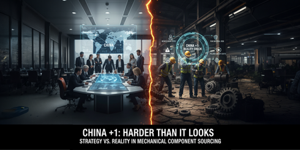Challenges in Picking Suppliers for EV Vehicles!
If you’re an automotive manufacturer in the electric vehicle market, you’re already dealing with supply chain issues, but you also may be plagued by something else: Finding a trusted and reliable supplier for high-quality Tier I castings, forgings, machinings, and stampings for your electric vehicle (EV) production line.
Of course, you may be tempted to blame the COVID-19 pandemic for your supplier woes and believe there’s nothing you can do about it. While the global health crisis has, undoubtedly, had an effect, it doesn’t deserve all the blame. Sure, it’s been a challenging time but things are far from hopeless. In fact, we’ve already talked about how MES is effectively managing the supply chain in spite of the obstacles of flying blind.
Before you resign yourself to another year, month, or minute of problem-laden production, please know that you have options. And you’re going to need these options if you are a traditional automotive manufacturer that’s planning to be part of doubling EV production to nearly 7 million by 2026.1
Here are 5 tips for finding an EV components and parts supplier that can confidently rely on as you move ahead with your e-mobility production plans.
1.) Get clear about what you want.
It may seem obvious, but before you do anything else, make a wish list of what you want from your supplier. Here are some questions to get you thinking about what to put on your list:
- Who is my ideal supplier?
- What role will they play vs. what role will we play?
- What are the pros and cons of working together?
- What expectations do we have for cost? Lead times? Warehousing?
- What quality guarantees, payment terms, and delivery promises are important to us?
- Will our manufacturing be done onshore (domestic) or offshore (international)?
- Do we need prototyping, tooling, engineering, or other services?
2.) What are you buying – Prototypes, Pilot, Low Volume Production or High Volume Production
One of the most important struggles of new Electric Vehicle manufacturers is to build several lots for crash testing, fuel economy, reliability testing and hundreds of other tests. While it would be ideal that components for these are made by production suppliers, it’s mostly not feasible for them to do small lot manufacturing. Most of the car launches also have few small volume trials for testing and marketing purposes – high volume current production suppliers often struggle with those as well. It would be ideal for new EV manufacturers to identify suppliers for prototypes, pilot builds, first/second year low volume production suppliers and finally, high volume production.
3.) Be Engineering Focused.
Now that you have narrowed your list of potential suppliers, it’s time to get serious and take a deeper dive into each of their capabilities. Here’s a sampling of the key things you’ll want to dig into when you talk with them:
- Components: Which mechanical components can you supply for electric vehicles? Do you supply inverters, power electric controllers, stators, rotors, motor housings, and a range of chassis parts?
- Materials: Do your materials capabilities include aluminum, brass, copper, magnesium, zinc, carbon steel, ductile iron, (ADI), grey iron, and stainless steel?
- Lead Time: What is your average tooling lead time? Do you offer rapid tooling services?
- Costs: How much will each of our EV components cost to manufacture? Can you reduce our tooling costs by as much as 50%?
- Methodologies: What is your typical business process for sourcing suppliers? How can we trust that you won’t have supplier issues, too? Are your suppliers ISO certified?
- Value-Added Services: What other services can you offer that might benefit us, such as quality management, global logistics, domestic operations, and inventory management?
- Experience and References: How long have you been in business? What is your experience in the EV industry? Can we talk with your other customers? What are the benefits of partnering with you for our electric vehicle parts and components?
4.) Ask about their quality management process.
Because EV manufacturing is still a relatively new industry that’s changing the way automotive manufacturing is done, it’s important to have a supplier that understands your need for lightweight, corrosion-resistant EV parts. Whether your production needs are for BEVs (battery electric vehicles), PHEVs (plug-in hybrid electric vehicles), or NEVs (new-energy vehicles), you’ll want a manufacturing supplier that has a quality management system in place to ensure the quality of everything from raw materials to production methods to parts inspection. Suppliers must have strong APQP management, sub-supplier management and production quality control processes and capabilities.
5.) Supplier Audits.
This is probably the least tangible yet most important tip for finding your best EV parts supplier. Do a gut check along with checking off your wish list to be sure that you can trust your supplier to take the lead when it comes to overcoming obstacles and resolving issues. Most robust supplier selection companies have sourcing audits (which is primarily conducted by purchasing team members) followed by more elaborate quality systems audit, conducted by quality professional. Purchasing team members should do a sourcing audit (usually 1-3 hours) to evaluate and confirm quick capabilities, management attitude and commitment and competitiveness. Once these are established, supplier quality team member should do an elaborate quality systems and process audit to verify suppliers quality and process capabilities.
You’ll also want an EV components supplier that delivers not only the part, but also uncompromising levels of engineering design support, design for manufacturing reviews, offers precision components, quality, and dedication to you and your success. The last thing you need is to be left in the lurch by a partner who is uncommunicative, uncooperative, or noncompliant.
How to Really Find the Best Electric Vehicle Parts Supplier
How much time, energy, and money have you wasted over EV supplier issues? Put an end to it with e-mobility solutions and next-generation EV parts from MES. We’re here to help take the burden of unpredictability and instability off you, so you can be free to invest your valuable resources into things that matter—like development, production, and marketing.
At MES, we promise our customers that we will:
- Lower component costs over domestic sourcing by up to 55%
- Reduce inventory levels from 56+ days down to 3 days
- Deliver JIT direct deliveries from our conveniently located warehouses
- Develop custom-engineered, high-quality, to-spec product deliverables
- Shorten tooling lead time by as much as 6-8 weeks
Are you an OEM manufacturer of electric vehicles or a Tier 1 EV automotive supplier in need of best-in-class manufacturing engineered supply chain solutions? Let us know.
References:
- com. “The EV Supply Chain Is Under Pressure. Fixing It Isn’t Simple.” Accessed 26 July 2022, https://www.barrons.com/articles/ev-supply-chain-tesla-gm-ford-51647974089.




